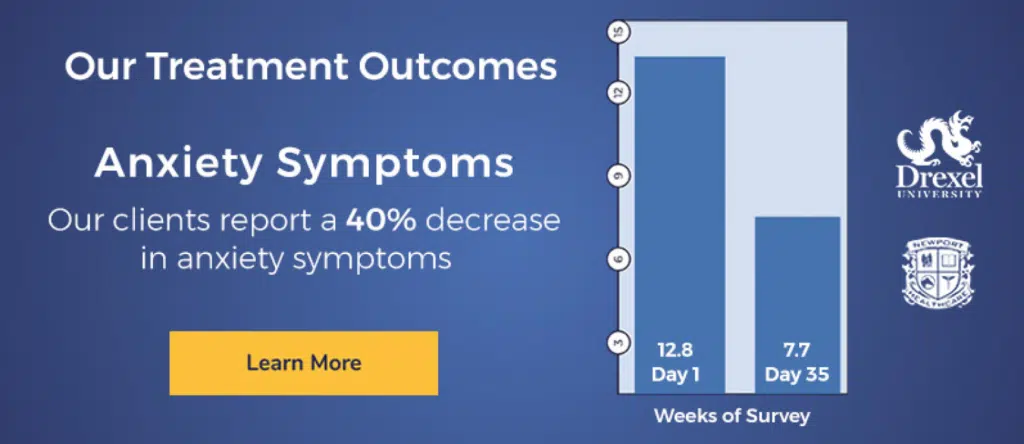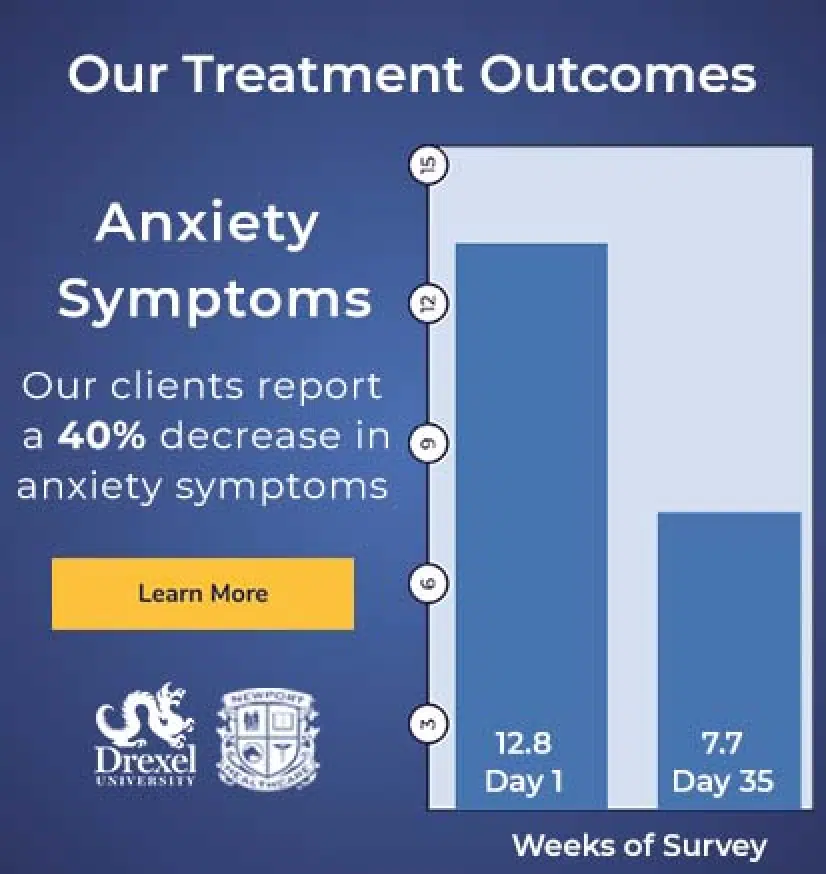The constant worrying, irrational fears, and self-judgment associated with teen anxiety can be paralyzing. Compassionate, evidence-based treatment helps anxious teens heal the root causes of their symptoms, so they can move from struggling to thriving.
Some amount of anxiety in childhood or adolescence is to be expected. Kids and teens are navigating a multitude of challenges and changes that come with maturing physically and mentally. But if acute anxiety symptoms arise during the teen years, or if a childhood anxiety disorder continues to get worse, it’s essential for young people to receive additional support.
How to Help Teens with Anxiety
One of the most important ways to help teens with anxiety is to make sure they know they are not alone. In the wake of pandemic-related isolation and remote schooling, a full 40 percent of US teens report anxiety symptoms. Globally, one in every five adolescents experiences anxiety. Traumatic experiences, academic pressure, social media overuse, and troubling societal issues all contribute to the high rates of teen anxiety.
Anxious children and teens need to know that anxiety is common, that help is available, and that they won’t have to suffer with anxiety forever. Therefore, parents need to have ongoing, open communication with their kids about their anxious feelings and the lifestyle and treatment options available. For example, everyday things that help teen anxiety include:
- Physical activity
- Yoga and meditation
- Healthy diet
- Breaks from technology
- Getting enough sleep.
Assisting your teen to find support and read about others with anxiety disorders can also help them to feel validated and seen. Understanding that this is not their fault and that there is hope for a better future may give them courage and motivate them to engage in treatment for their anxiety.
Types of Anxiety
Parent-child communication and self-care strategies are important, but they may not be enough to address the needs of teens with anxiety. If adolescents’ mood, functioning, and/or physical health are affected by anxiety on an ongoing basis, or if symptoms are severe, the next step is an evaluation by a healthcare professional to determine whether a teen is suffering from one of these types of anxiety:
- Generalized anxiety disorder (GAD)
- Social anxiety
- Anxiety related to school
- Separation anxiety
- Panic attacks, also known as panic disorder
- Obsessive Compulsive Disorder (OCD)
- Specific phobias.
If you are seeing any of the signs and symptoms of anxiety in your teenager, an assessment with a provider should also include a discussion of treatment options. Weekly therapy can be a progressive step in helping teens with anxiety. When anxiety has become more acute and is interfering with a teen’s daily life, outpatient or residential care may be the best and most effective choice.
Benefits of Teen Anxiety Treatment
- Tools for managing anxiety: In the short term, clients at anxiety treatment centers for teenagers learn tools to help them recognize anxiety triggers and practice emotional regulation. Moreover, they learn relaxation techniques to address both mental and physical symptoms. And they practice techniques to reframe negative and anxious thoughts, so they can focus on the reality of a situation rather than the worst possible outcome. These healthy coping mechanisms can make a positive difference right away for teens with anxiety, significantly easing their emotional pain and discomfort.
- Connection to end isolation: Isolation and loneliness are two of the biggest factors contributing to teen stress and mental health issues like anxiety. Time in residential or outpatient treatment allows adolescents to benefit from peer support and community, and to practice relationship-building skills that will help them create stronger connections as they mature.
- Healing underlying trauma: Clients at a teen anxiety treatment center typically receive individual, group, and family therapy to address underlying issues related to teen anxiety, such as childhood trauma, acute trauma, and disruptions in the parent-child connection. Processing and healing relational trauma supports teens to move forward into the next stage of life with greater self-understanding and a stronger bond with their parents or caregivers.
- Recovery from co-occurring disorders: Teenage anxiety treatment also focuses on helping adolescents heal from any co-occurring issues, like substance use disorder or eating disorders, that they may have developed in order to cope with anxiety.
Ultimately, long-term healing from teen anxiety involves a combination of medication for teenage anxiety and treatment approaches designed to help young people build self-compassion, self-regulation, and authentic connections. Each teen may need a different type of therapy or treatment for reducing anxiety symptoms and underlying causes.
Insurances We Work With
We work with most major insurance companies, including both In-Network and out-of-network payers, to optimize access to care for families.













Teen Anxiety Treatment at Newport Academy
Newport Academy’s specialized treatment for teens with anxiety incorporates a wide range of modalities to support teens in achieving long-term, sustainable healing. Each client receives a tailored treatment plan for adolescent anxiety, designed by a team of medical and clinical experts in response to the teen’s and family’s specific needs and history.
Our Clinical Model
Newport’s differentiated clinical model addresses the underlying trauma and attachment wounds catalyzing mental and behavioral health issues such as anxiety in adolescents. The foundation of our programming is our team of compassionate behavioral healthcare professionals, with extensive experience and understanding of how to help teens with anxiety—including psychiatrists, psychologists, family therapists, nurse practitioners, equine therapists, art and music therapists, adventure therapists, registered dietitians, teachers, private tutors, and more, with a wide range of degrees and experience.
Furthermore, our approach to teen anxiety treatment views family as central to the healing process. We are the only treatment program to utilize the groundbreaking Attachment-Based Family Therapy (ABFT) methodology, and to receive ongoing training and consultation from the co-founders of this scientifically validated therapeutic approach.
Our Therapies
Every teen is unique, and thus may respond more to certain types of therapy than they do to others. Some clients find it easier to express themselves through art and music rather than verbally, while others are drawn to outdoor Adventure Therapy or equine therapy. At Newport Academy, we use time-tested clinical modalities, such as Cognitive Behavioral Therapy, proven to be effective in addressing anxiety and co-occurring issues such as substance abuse and disordered eating. In addition, clients participate in somatic and experiential therapies that address teen anxiety disorders by activating the parasympathetic or “rest and digest” nervous system.
Newport’s teenage anxiety treatment program utilizes a variety of evidence-based clinical, experiential, and academic modalities. Services may vary depending on treatment location.
Clinical Modalities
- Cognitive Behavioral Therapy, considered the most effective modality for teen anxiety
- Dialectical Behavioral Therapy
- Family therapy using Attachment-Based Family Therapy
- Emotional Freedom Technique
- EMDR (Eye Movement Desensitization and Reprocessing)
- Acceptance and Commitment Therapy
Experiential Modalities
- Yoga and mindfulness exercises
- Music and art therapy
- Mixed martial arts and fitness activities
- Equine-Assisted Therapy
- Adventure Therapy
- Culinary and horticulture therapy
- Healthy device management
- Community service
Levels of Care Offered
Newport Academy is a different type of teen anxiety rehab. We provide a full continuum of care, including adolescent residential treatment centers and a full suite of outpatient programming, with Partial Hospitalization Programs (PHP), Intensive Outpatient Programs (IOP), outpatient services, telehealth, and alumni programming. Teens in our residential programs and PHP spend time in the classroom each day, in addition to participating in individual, family, group, and experiential therapy. Helping teens with anxiety may take a variety of modalities or levels of care to properly address their unique situation.
Our locations in beautiful natural settings feature on-site gardens, art and music studios, gyms, peaceful spaces for yoga and meditation, and academic classrooms and Learning Labs outfitted with the latest technology. Because trauma-informed care extends to every aspect of treatment, all of our program locations provide safe, comfortable, home-like environments where teens can relax, open up about their mental health struggles, and bond with peers and mentors.

Teen Residential Treatment
Research finds that residential care provides the support, structure, and caring community that teens need to heal from anxiety. Each adolescent’s individualized residential treatment plan incorporates clinical, experiential, and academic elements to address the underlying causes of teen anxiety.

Partial Hospitalization Program
This PHP level of care offers programming all day, five days a week, for teens who need more than weekly therapy but who do not qualify for a residential level of care. A PHP offers comprehensive clinical care and a stabilizing routine, and teens return home to their families at the end of each day.

Intensive Outpatient Program
For clients who are continuing to attend school during the day, an IOP with afternoon hours provides teen anxiety treatment throughout the week, with regular check-ins and support groups for the entire family. With Outpatient Services, teens attend the program fewer than five days a week, as needed.
Our Accreditations
Newport holds the Gold Seal of Approval® from The Joint Commission, the nation’s oldest and largest healthcare accrediting body, and is affiliated with a wide range of national organizations and certification bodies.





Additional Articles on Teen Anxiety
Our extensive library of resources for parents and professionals provides the latest research on anxiety and other teen mental health issues, as well as tips and insight from our thought leaders. Learn more about the multiple facets of anxiety and how to support teens who are struggling.
How Teens Can Practice Reframing Negative Thoughts
Reframing can help teens with anxiety to break the habit of negativity and see the world, and themselves, in more positive ways.
Parenting a Teen with Anxiety
For parents of anxious teens, it’s difficult to know what to say, when to take action, and when to let teens work through the challenges they’re facing.
What Should I Do If My Son Stays in His Room All the Time?
In the wake of remote learning, many adolescents are still struggling with anxiety and depression, and haven’t reestablished in-person social groups or activities.





